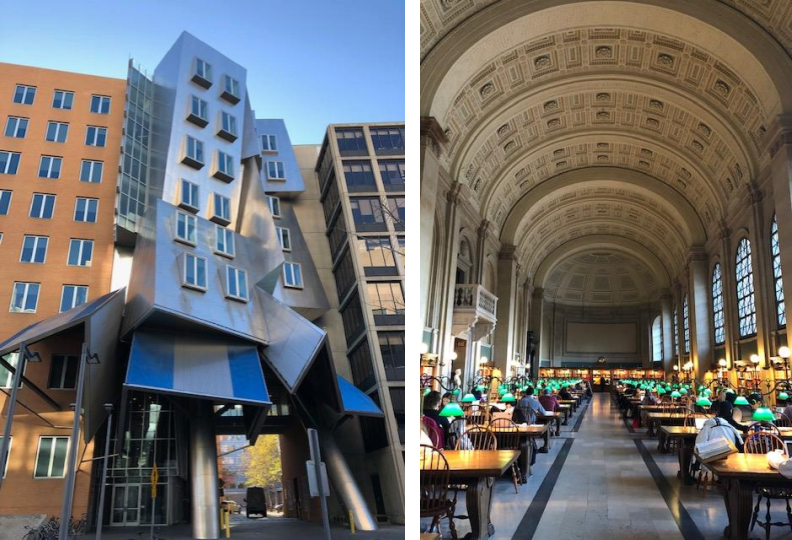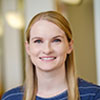This article is more than 5 years old.

This past weekend I attended WikiConference North America in Boston, Massachusetts. (Yes! A Wiki Conference!) The conference mostly took place at the MIT Stata Center. Attendees seemed to be an eclectic mix of longtime Wikipedians (volunteers), folks who work for Wikipedia, academics, librarians, and other GLAM (galleries, libraries, archives, museums) partners.
Perhaps the first thing to know is that the WikiConference is about more than just Wikipedia. The Wikimedia Foundation hosts many projects, only one of which is Wikipedia. To me, it seemed the project generating the most buzz and excitement was Wikidata (this link opens a video), which is a repository for data that can be queried by a user to answer questions. There was also a lot of energy around Wiki + GLAM partnerships, and how GLAMs are contributing their content to projects like Wikidata to make them more accessible and usable.
The plenary keynote was reflecting on Wikipedia @ 20 (pause on the fact that Wikipedia is 20 years old!) As one panelist pointed out, most of our incoming college students have not lived in a world without Wikipedia (wow!). Another panelist noted Wikipedia’s evolution through the years from more of “wiki” to more of an “encyclopedia” – the example given was that there’s no longer a dedicated Wikipedia page for every Pokemon character. Someone asked what they wished had been done differently, and it was gratifying to hear one of the panelists say they wish they had addressed the hostile editing environment much earlier.
What surprised me most about this conference (though it probably shouldn’t have) is how much overlap there was with some of the current “big issues” in information literacy. There was heavy discussion in almost all the sessions I attended around misinformation and fake news. One intriguing thread I’m following is this keynote by Dana Boyd (below) from 2018 which made the argument that, “many of the forms of critical thinking that we’ve introduced into American education are backfiring right now.” It’s really, really good and I’m still sitting with it days later – essentially the argument that we’ve taught our students to be critical too well, and where to go with that. To be honest, I’ve been somewhat avoiding fake news in my own classes because of this very issue. But this conference is giving me the kick in the pants I needed to think more about this issue and work on it over the summer.
I was planning to just attend this conference as an attendee, but I did get roped into presenting. One of my contacts at WikiEdu (Wikipedia’s educational branch, which provides support for all the college-level Wikipedia courses) asked me to be on a panel of university professors who are using Wikipedia to teach information literacy (I actually think you stream it here Room 123 – Day 1 – Session 3). It was great to finally meet some of the contacts I’ve made at WikiEdu in person and to meet other instructors using the platform.
There were other #critlib-minded folks around WikiCon as well, which was great to see. The best session I attended was titled, “A Colonizer’s Account: Use and Misuse of Historical Sources.” This is something that has come up in my own class – the writing of articles about underrepresented groups from the perspective of the white/European men who wrote about them. The general idea was that Wikipedia authors can unintentionally replicate viewpoints presented in primary sources, and that if we do not center non-European perspectives, we will write bad history. It was SO GOOD y’all. Unfortunately, the presenter did get some low-key pushback in the Q&A. I did as well (on Twitter) during my own session, which was also very much about critical information literacy concepts. Though, to give credit, most of the audience was totally on board. But, I’m happy to chat more about this if you are curious!
But now! More photos!


9 Comments on ‘Amanda @ WikiCon’
Amanda, thanks for this post! I didn’t even know WikiCon existed! I can’t wait to see what you develop regarding Fake News in your classes! (and be prepared for me to ask to use what you develop for my own classes because I know whatever you develop will be excellent!)
Thanks Amanda, (and thanks for all the links), this sounds like a great conference. Can’t wait to delve deeper about the historical sources component…
Haters be hatin’. Thanks for this writeup! The Wiki community is so fascinating: they’re so hopeful, so open, and so idealistic, but sometimes so hostile to criticism from the outside. Keep doing amazing work, Amanda! You and your students are making Wikipedia more awesome for everyone.
This sounds like such a great conference. There was a session at Charleston that I didn’t get to about improving citations in Wikipedia – I’m going to look for the recording and maybe we can watch together. I was just noticing the ‘encyclopedianess’ of Wikipedia the other day but it makes sense seeing that it is 20 YEAR OLD! WHAT?? It has followed the trajectory of information, right? Primary sources (hey! I know stuff about that topic – I’ll write something) become secondary (we need citations for our claims, we need cooperative research, we need to flesh out these ideas better), become tertiary — everything old is new again, maybe?
Congrats on your invited presentation, Amanda! Thanks for sharing!
Thanks for the interesting write up from the “front lines”. It is the crux of the mater to note that when everything is open, that necessitates room for everyone’s argument, even if it’s wrong, and by wrong I mean not wrong opinion, but not factual. Calling that a “hostile editing environment” is dead on.
What an amazing conference, Amanda! I’d love to know more about the backfiring of critical thinking skills. And good to know people are becoming aware of issues when white/European male sources are not carefully evaluated and criticized for bias in viewpoints/recording of history.
Thank you for sharing Amanda! I love the fact that the entire conference was streamed and can be watched later by anyone.
This sounds like a really fun and important community to engage with – glad you attended, presented, and enjoyed a frosty Boston!